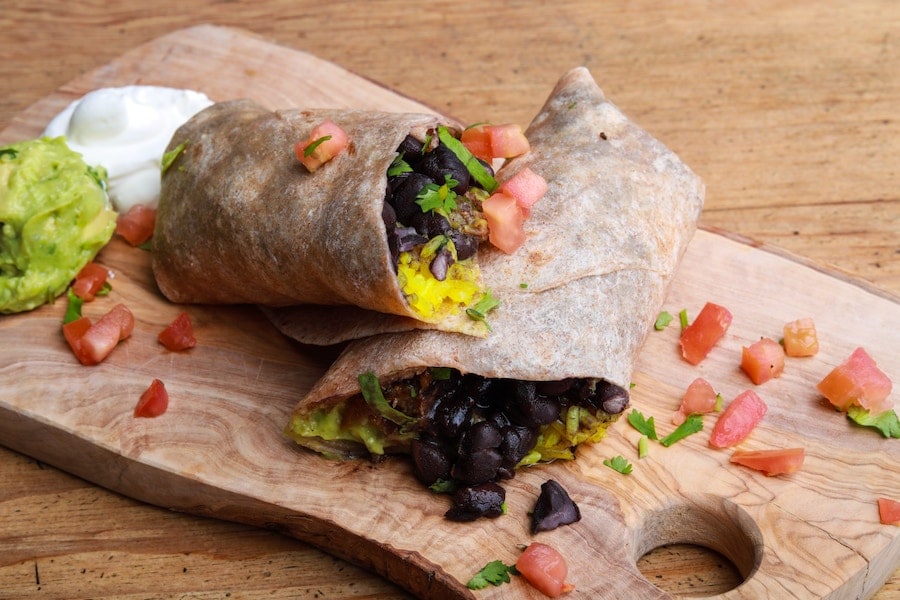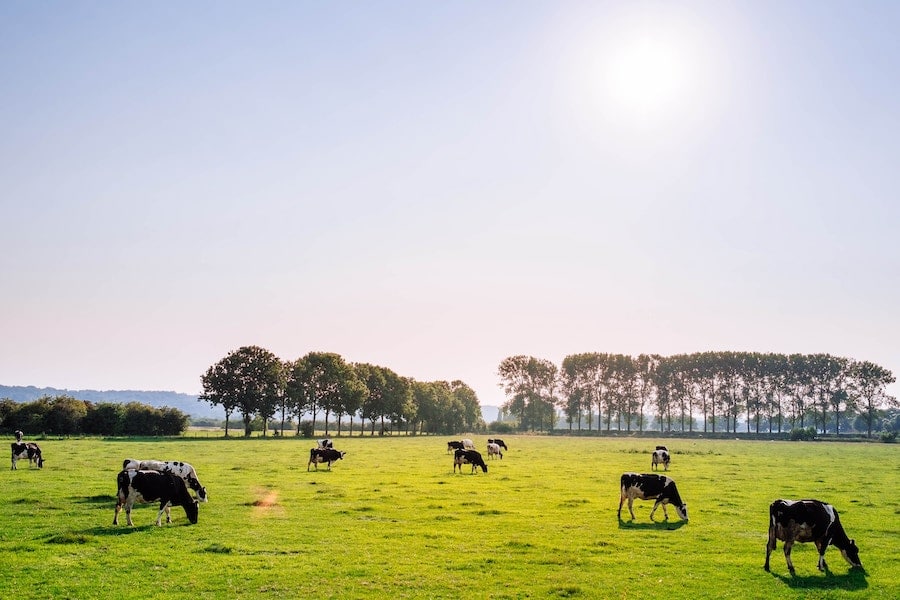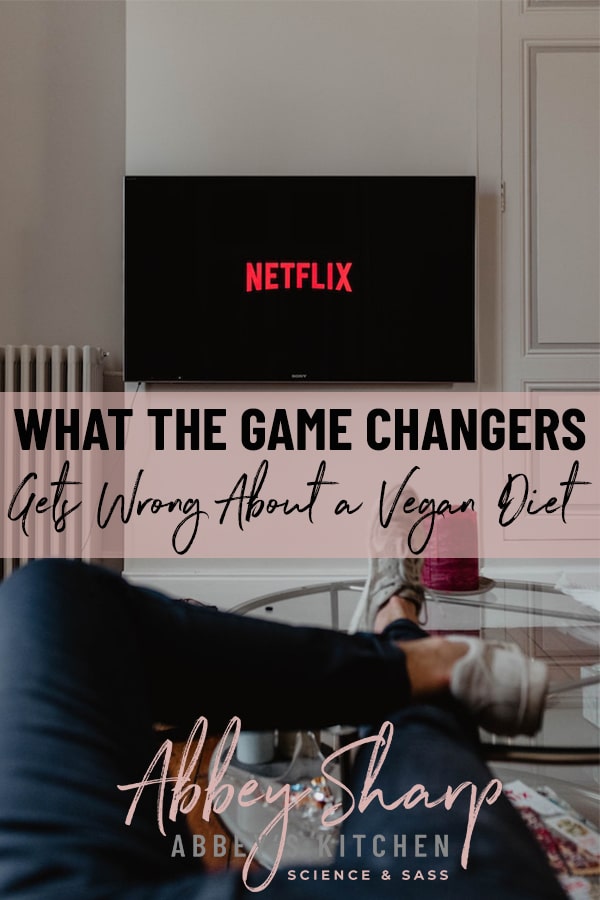We review Netflix’s popular food documentary The Game Changers and discuss what the film gets wrong about a vegan diet and what the research says.
Now when I heard that another vegan Netflix documentary called The Game Changers had surfaced, I immediately rolled my eyes and thought it would be just like What the Health (if you haven’t already, you can check out my review of What The Health here) . But after hearing a ton of positive reviews and having a lot of people directly ask me to review it, I knew it was time to give it a watch.
Before starting this review, I want to start off by saying I was pleasantly surprised with the film and overall, I think it was very well done. While I am not personally vegan, I think the research is very clear that we can all benefit from incorporating more plants into our diet. In part one of my review I discussed what Game Changers gets right about the vegan diet. Now in part two of this review, I’m going to be discussing what Game Changers gets wrong about a vegan diet.
Now let’s dive in.
What Is the Game Changers About?
For those of you that don’t know, Game Changers is a vegan documentary that was released in late 2019. It follows James Wilks, a UFC fighter and a military combat fighting trainer. A few years ago, James experienced a terrible knee injury that led to him having to take many months off of fighting to recover.
After reviewing hundreds of research studies during his time off, James stumbled upon a study about the “gladiator cemetery”, in which a total of 22 gladiator skeletons were analyzed. Side note, the movie says there were 68 skeletons, 31 of which were non gladiators but I digress. What the researchers found was that these men had tremendous bone mineral density and strength. After analyzing their bones, the researchers found that these men had very high levels of strontium, suggesting they ate a primarily plant-based diet. Note that the authors did say that the gladiators were not vegan and did consume some animal products, but that they ate mainly plants.
This is apparently the study that inspired James to turn to a vegan diet in effort to speed up healing and improve his overall health. So Game Changers follows James’ journey to healing and also checks in on the stories of other athletes who follow a purely plant-based diet.
So, now that you have a rough idea of Game Changers, let’s dive into what Game Changers gets wrong about a vegan diet.
What the Game Changers Gets Wrong About A Vegan Diet
Like with anything, if there’s good, there’s usually some bad too. Let’s start with some of the problematic claims I picked up on in the film.
Claim #1: Comparing peanut butter sandwiches to beef or eggs in terms of protein quality and quantity
In the film, a Dr. Loomis compares the protein quality and quantity between some plant based foods and animal products. They mention that “1 cup of cooked lentils or a peanut butter sandwich has as much protein as 3 ounces of beef or three large eggs”. The doctor also mentions that the theory that plant-based proteins aren’t complete is false.
Now I love peanut butter and I eat it several times a week, but let’s take a look at how these things stack up.
One large egg has 6 grams of protein, so there are 18 grams of protein in three eggs.
One 3-ounce steak has around 17-21 grams.
If we assume that a peanut butter sandwich has 2 pieces of bread and 2 tablespoons of natural peanut butter, then 2 pieces of bread has around 8 grams of protein and 2 tablespoons of natural peanut butter has around 9 grams of protein for a total of 17 grams of protein.
So, yes, it’s around the same amount as eggs and a little bit less than steak.
Here’s the thing though, this peanut butter sandwich has around 371 calories. The steak has around 113 calories. The eggs have around 215 calories. Although having a peanut butter sandwich is totally awesome, we can’t ignore the fact that you have to have almost twice the amount of calories just to meet your protein needs through plants (at least for this example.)
This is usually the case with a lot of plant proteins. For example, to get 20 grams of protein from almonds, you’d need to eat two-thirds of a cup which also equals around 542 calories. Again, I’m not dissing plant-based proteins. I love them, and I love almonds, but if we look at this protein on a gram for calorie basis, some options are more “efficient” than others.
Another thing to keep in mind is that plant proteins tend to have lower bio-availability compared to animal proteins. What’s more, they’re not always a complete source of all essential amino acids – despite what Dr. Loomis says in the film. With that being said, you can totally get enough essential amino acids from plant-foods. You just have to make sure you’re getting different sources of plants so you cover all your amino acid bases.
Finally, in the specific instance of sports nutrition, you wouldn’t want to have a peanut butter sandwich after a workout because that fat will slow down the update of the protein. Ideally we want a low fat meal with a combination of carbs and protein after a workout for this reason.
Claim #2: The Burritos Centrifuge Experiment
The documentary goes into great detail when discussing The Burritos Centrifuge Experiment, however there are a ton of flaws from the get-go. First their study participants. They have an NFL player that has been vegan for many years and then NFL players that are adamant about eating their processed food. So, right away, you don’t have apples-to-apples comparisons. What would be a better comparison is if you had a vegan, an omnivore that eats minimally-processed food, and then another person who eats a lot of processed food. Even that will be rife with confounders but still, it’s at least a bit more realistic.
We also don’t have apples-to-apples comparison with the burritos in the experiment. The vegan burrito uses black beans which are high in carbs and protein, but very low in fat. The meat burritos are much higher in fat content. This is a problem because after eating food, fats are packaged into chylomicrons and enter the blood. So, yeah, after eating a high fat meal you’re going to see higher levels of fat in the blood. Furthermore, research has shown that certain types of low-fat, lean animal products are linked with better endothelial function. So, while this experiment is eye-opening for people who eat a lot of high-fat, processed food, it’s not a good comparison for those who have a more whole food, balanced diet and who consume lean meats or poultry or seafood in moderation.
Finally, I just want to bring up the fact that there is an inherent problem with documentaries and claims that people are funded by the industry. The study they refer to for this experiment was actually funded by Hass Avocados. Also, not to mention it only had 11 subjects. Now, I love love love avocados and I also think research studies can be done very well even if they are sponsored. I don’t have an issue with it as long as its still good research which I mean, 11 participants, hm not really. But ultimately it’s only fair that if we’re going to dismiss research studies being funded by meat and dairy, we probably shouldn’t be using funded studies by plant based industries as our rebuttal.
Claim #3: Inflammation and Meat Consumption
We do know that we should reduce both our red meat and processed meat consumption, that’s nothing to argue about. However, I see so many people throwing around the word “inflammation” as if it’s a simple black-and-white process.
While I could go on forever on this topic, my biggest problem with the film is that they try to associate all animal products with an increase in inflammation, whether or not its highly processed.
In a recent 2017 meta-analysis and systematic review, researchers did find an association between meat and an increase in C-reactive protein – a type of inflammatory marker. However, they found that this association was mitigated when they controlled for BMI. The researchers suggested that a higher BMI or body weight had more to do with increased inflammatory markers than the meat did.
What’s more, a 2018 systematic review found that milk products did not increase levels of inflammation in healthy people or people with metabolic disorders. In fact, they found that most studies showed a protective effect against inflammation from milk products. Now, I’m not telling you to go chug a gallon of milk or eat 5 pounds of cheese. I’m just saying that we need to be careful with making widespread claims about nutrition and disease when that’s not always what the research is truly telling us, especially when consumed in moderation.
Again, we know that eating a diet high in plants is linked to so many health benefits and at this point, we need more research on animal products. Whether you’re vegan or a hard-core meat eater, we all benefit with more plants in our diet.
Claim #4: Animals are jacked on plant-based proteins, so we should be too
Like I mentioned earlier, humans have different digestive systems than other animals. Cows have a four-chambered stomach which allows them to properly digest grass and extract a higher amount of amino acids from the grass. Humans, on the other hand, do not have the ability to digest grass. Therefore, arguing that we should be able to build muscle off of plants using that example just doesn’t make sense.
Also, we’re not like gorillas either. Gorillas have a larger colon than humans have, allowing them to break down plants significantly better. This is also why gorillas can digest a lot of stems and fibrous plants but humans can’t – or at the very least we need to cook it down and pulverize it.
Gorillas also eat upwards of 40 pounds of food per day. That would be a really big meal. So again, it’s not an apples to apples comparison to think of us like other animals.
Claim #5: Comparing processed animal food to whole plant food
If you notice in the film, they seem to always compare high fat highly processed meats to whole, unprocessed plant food. A good example is when they meet with the Miami Dolphin players. Here we see one of the players touting how he loves fried chicken and would never be able to give it up.
But fried chicken is literally dipped in a bath of fat to be cooked. So, no, it’s not going to be a healthy choice to choose every day. On the other hand, a chicken breast is quite low in fat and a high source of quality protein.
And then there’s Arnold’s diet. He used to eat 15 eggs a day and since adopting a plant-based diet, his cholesterol levels have dropped significantly. Sorry, but having 15 eggs a day is a bit over the top, and I wouldn’t expect or recommend anyone to be loading up on animal products like that.
Claim #6: Milk lowers testosterone in men
I love the fact that they promote soy products and dispel the myth that soy products are high in estrogen.
However, they then took a weird turn and started talking about cherry-picked data.
Problem is, the research study they look at had 7 men, 6 prepubescent children, and 5 women. And even though that’s already a super small sample size, they only talk about the 7 men, making the sample size even smaller. In the men studied, estrogen secretion temporarily increased while testosterone secretion temporarily decreased. However, what James failed to mention was that these levels only changed temporarily and peaked around 1 hour. After that, it went back to normal. James words it a bit differently by saying “drinking a cup of cow’s milk can increase a male’s estrogen levels by 26% in just one hour, while dropping their testosterone levels by 18%”.
This suggests that in just an hour it increases to that much, with no mention of it going back down. Again, I’m not suggesting that these hormonal changes are a good thing and its your prerogative to eat whatever you feel comfortable with, but not discussing the full effect seems really misleading.
We definitely need more context.
Okay now let’s talk about some my other grievances with the film and some of the themes I didn’t love in Game Changers.
Themes I Didn’t Like in the Game Changers
Theme #1: The film makers had a clear agenda
Just like any type of documentary, Game Changers had a clear agenda: to get you to follow a vegan diet.
It’d be the same for any keto, paleo, or any other documentary. The people who make these documentaries are making them for a reason and it’s their job to make their case as compelling as possible.
While I think that they navigated this pretty well, especially compared with some of the other shockumentaries out there, I think it would have been a good idea to really emphasize their own personal bias. All of the people who spoke on the film were either predominantly or completely plant-based, so obviously they’re going to be a little biased.
Now let’s be clear, it’s impossible to be completely Switzerland, even though, you know I’m trying. We all have our own unique experiences that put a certain biased lens on us. However, taking the time to reflect on our biases can help us make sure it doesn’t affect our professional opinions. That’s something I’ve been doing here at Abbey’s Kitchen and I think I would have trusted the content more if I had seen that happening.
If they wanted to appear more unbiased, they really should have included both sides. Instead, they only spoke to people who followed a plant-based diet and/or advocated for one.
Again, it’s not as biased as I’ve seen in other documentaries, but it’s still something they could have improved on and still made a point because the science in itself is compelling enough.
Theme #2: Conflict of Interests
As I just mentioned, the film had doctors, experts, and athletes that already follow a plant-based diet. So, there’s an inherent bias. Furthermore, a lot of the people that they interviewed had unmentioned conflicts of interest which I really don’t like such as:
James Cameron – Film maker of movies such as the Titanic and Avatar and also the founder and CEO of Verdiant Foods, a vegan pea protein company
Dr. Aaron Spitz – Author of “The Penis Book”, which is a plant-based book
Dr. Robert Vogel – Author of “The Pritikin Edge”, another plant-based book
Dr. James Loomis – Owner of a plant-based meal planning service
Dr. Ornish – Author of “Undo-it!” and seller of vegan retreats and online programs
Just to name a few.
Also, when you use celebrities such as Arnold Schwarzenegger to promote a lifestyle, they obviously will have a huge impact due to their celebrity card.
While these speakers are experienced and successful in their careers, they really should list their potential conflicts of interests if they’re going to try to call out other professionals and researchers for theirs.
Theme #3: Lack of professional representation
In the film, you see a number of plant-based doctors and athletes talking about plant-based eating, but that’s about it. They don’t interview dietitians, who are the experts in nutrition. Look, if you’re going to talk about nutrition, you should always have dietitians. It’s like talking about brain health and not having a neuroscientist or neurologist. They’re the experts!
Unfortunately, there was only ONE registered dietitian in the film and it was one they conveniently cherry-picked from a CNN interview in which the dietitian advocates for meat consumption.
Like they mention in other areas of the film, you can find anything to support your argument if you look hard enough. Taking a clip from one dietitian and generalizing it for all dietitians is completely unfair and inaccurate.
While the dietitian is correct in saying that we can’t establish a cause-and-effect relationship between meat consumption and cancer, I think that I can speak for a lot of dietitians here when I say we all would benefit from reducing our meat consumption. I think we need to meet people where they are and that may mean making leaner choices, or lower sodium choices, or swapping one meat meal a week with plant based protein etc. I’ve been pretty clear on my personal belief that all foods can fit, and it doesn’t have to be an all or nothing approach.
On a side note, I recently watched an interview by James in which he says that while they probably could have had more dietitians in the film, the Academy of Nutrition and Dietetics is sponsored by the meat and dairy industry.
Even though I’m Canadian and am part of a different professional body, I want to make this clear: We are not sponsored or controlled by any food industry. I’ve spoken about my personal involvement in one of my YouTube videos HERE.
And I agree, it’s unfortunate that ANY food industry has sponsoring conferences or events. But I also know that learning opportunities like conferences require money. And while I’m going way off course here, I will note that even at conferences I’ve been to where let’s say a meat or dairy industry has signed on as a sponsor. I’ve never seen it impact the content or learning that takes place, and I’ve been to lots of great webinars and keynotes about the benefits of plant based eating. So for the same reason I don’t like that doctors’ conferences are sponsored by pharmaceutical companies, I also know that all of us dietitians are still capable of evaluating the research and making balanced realistic recommendations based on it.
Theme #4: Too many personal anecdotes
While personal stories are helpful and give examples of the benefits of a plant-based diet, they aren’t real science.
Sure, the athletes said they felt better and probably did, but we can’t just use their experience as solid evidence. In fact, a lot of their claims regarding sports performance lack any concrete evidence or require way more actual research before any conclusions can be made.
Although I’m really happy that these people found success on a plant-based diet, there are also many (arguably even more) successful athletes that follow an omnivorous diet. So, highlighting that veganism and athleticism are not mutually exclusive experiences is great, it doesn’t negate the idea that success as an athlete is also possible following an omnivore diet. Yet, because we don’t see that experience or any solid research comparing these, we don’t know that.
If we become too reliant on personal anecdotes, then we’re opening up a crazy can of worms where we can make any claim we want regarding health and believe it’s true. Could you imagine if someone said, “I started eating two bags of gummy bears a day and felt better” and decided that was enough to promote a gummy-bear diet? I know it’s an extreme example, but I see this shit happening all the time and it’s literally why I have a job.
Theme #5: Lack of attention to whole foods
Throughout the film, you see James touting the benefits of a plant-based diet and that many animal products have not-so-great ingredients. However, they fail to acknowledge that processed plant foods aren’t inherently healthy either. If we know anything about nutrition, it’s that whole, minimally processed foods are key to health.
For example, in a 2017 research study of 73, 710 women, researchers found that a whole food, plant-based diet was linked to a 25% decreased risk of coronary heart disease. On the contrary, a processed plant-based diet led to a 32% increased risk of coronary heart disease. This goes to show that the form the food comes in matters a lot, maybe more so then whether it’s plant based or not.
While I understand that they’re trying to sell the idea that plant foods can taste delicious, they’re also (perhaps unknowingly) selling the idea that overly processed vegan foods are still good for you. Thanks to really good marketing, vegan foods, like gluten free foods, tends to have a real health halo going on, that reduce its contents to a simple one word tag- vegan. But are copy cat vegan big macs or vegan cookies really the best option to eat every single day? If this was the alternative, I would way rather see someone have a chicken salad and yogurt parfait.
Bottom Line on The Game Changers
Overall, I’d give this film a positive rating.
No, I don’t love everything about it and I think their use of some of the research is faulty but they do bring up a lot of important points and I also think it’s kind of inspiring. It definitely helps dispel the myth that a vegan diet and athleticism are mutually exclusive. I also think even for us non athletes, it serves as a good reminder that we all would benefit from a plant-based diet, even if that means just introducing more plants to our diet in general.
Keep in mind that nutrition science is extremely complicated. It’s not black-and-white. If it was, we’d all be living well into our 100’s. Trying to jam in nutrition science into a hour and a half documentary is nearly impossible, so I commend Game Changers for the effort they made.
While there are quite a few flaws with this film, their overall message of eating more plants is something I can totally get on board with.
Become an Abbey’s Kitchen Subscriber
Become an Abbey’s Kitchen Subscriber
Have you watched The Game Changers?
What did you think The Game Changers gets wrong about a vegan diet?
Let me know in the comments!
Contribution By:
Katey Davidson, RD, Taste of Nutrition
Updated on May 12th, 2020

Abbey Sharp is a Registered Dietitian (RD), regulated by the Ontario College of Dietitians. She is a mom, YouTuber, Blogger, award winning cookbook author, media coach specializing in food and nutrition influencers, and a frequent contributor to national publications like Healthline and on national broadcast TV shows.












Kim says
This is the first time I have read anything written by you. Your review of Game Changers is excellent in content, however, if you are going to write professional reviews you need to do a spelling and grammar check. There were multiple errors in this review which is distracting and takes away from the credibility of the review. I invite you to consider this the next time you write an article.
Abbey Sharp says
So sorry about that. I am reviewing it as we speak! Thanks for your comment.
Amanda (Amy) Giffin says
Found one for you: “Note that the authors did say that the gladiators were not vegan and did consume some animal products, but that they ate mainly PANTS.”
That one actually made me laugh a bit 😀
Abbey Sharp says
So sorry! Made those edits.
Manny says
Game Changers changed my life. I was eating lean chicken and fish and stopped and noticed my inflammation went down a lot. My performance increased by a lot and was able to work harder and not fatigue out like I used to. Vegan all the way!!
Abbey Sharp says
Thanks for sharing. Glad it has been working for you.
Bev says
I would have enjoyed it if you left in the typo about eating pants. Just saying 🙂
Abbey Sharp says
lol! thanks for the feedback 🙂
Lauren says
Just to clarify, The Game Changers is not a ‘Vegan Movie’, it is a documentary about the benefits of eating a plant-based diet, plant-based meaning that you get the majority of your calories from eating vegetables. Yes, the documentary does feature some Vegans, but this is not the base point of the documentary. Most of the featured may eat some meat or diary etc, Arnold still consumes eggs, but he gets the majority of his calories from plants.
I’m also not sure why there is surprise that they feature people in the doco that have as you said “conflict of interest”. Of course they do! I’m not going to do a doco on the benefits of breathing fresh air and have the head of a tobacco company feature in it. The alternate view of this doco has been everything we’ve been taught in schools for decades, its the ads on TV and radio, its literally splattered everywhere. We know what the other side has to say cause they have been saying for decades.
I’m glad you could still see the positives of the documentary and its message of eating plant-base, or just eating more plants in general.
Abbey Sharp says
Thanks for your comment Lauren. I was hoping to hear from a more balanced perspective like a registered dietitian.
Gillian DidierSerre says
This is the most comprehensive article I have recently read..there should be more such writing going on excellent..j will certainly watch game changers on Netflix and will send you an opinion
Abbey Sharp says
Thanks so much!